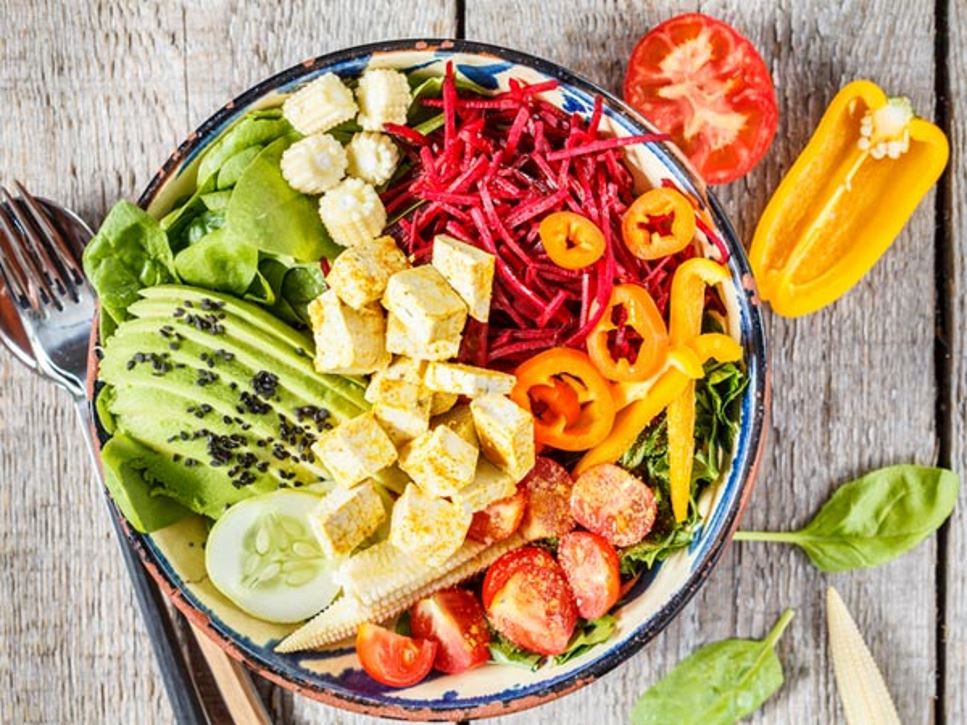Religious beliefs, philosophical concerns or health may lead a person to follow a vegetarian diet. But, becoming a vegetarian — especially if you've been a lifelong meat-eater — isn't always easy. Your best bet if you’re feeling overwhelmed? Switch to a vegetarian diet in steps. A gradual change will give you time to find plenty of vegetarian foods that you enjoy.
Find Foods You Enjoy
A good first step is to review your current diet. Make a list of foods that you regularly eat, paying special attention to vegetarian foods that you like. Next, aim to incorporate these foods — along with a variety of whole grains, fruits, vegetables and beans — into your eating plan. A good way to include vegetables, for example, is to add them to the foods you already enjoy, such as pasta or rice dishes.
Plant-based, meat-free products offer the opportunity to get the taste and flavor of meat without consuming the real thing. Choices may include soybean proteins, wheat proteins and other vegetable sources. Check your grocer's freezer department for vegetarian versions of hamburger, sausage, chicken or bacon. These are tasty additions to dishes including chili or casseroles.
If you're going vegan and eliminating all animal-based food products, look for dairy substitutes including calcium-fortified soy milk and yogurt.
Pick up a vegetarian cookbook or search the internet for vegetarian recipes and meal ideas, and explore vegetarian foods from various global cuisines. While American cuisine can be meat-focused, it's easy to find ample vegetarian options on many Asian, Indian and Middle Eastern menus. The supermarket is a good place to find vegetarian ingredients and ready-to-eat meatless foods from around the world.
Become a Label Reader
Label reading is essential for vegetarians since some seemingly meat-free foods actually contain animal-based ingredients such as lard, chicken fat or gelatin. Ingredients are listed in order from the largest amount to the smallest. These lists can help you make informed choices and avoid packaged foods made with ingredients you do not want to eat.
Another reason to read labels is to ensure you're getting essential vitamins and minerals. Poorly planned diets of any kind can lead to health problems. Most people get iron, zinc, vitamin B12, calcium and vitamin D from animal products such as meat and cow's milk. It's important for vegans and vegetarians to include other sources of these nutrients in their daily eating plans.
One good way to ensure this is by reviewing the Nutrition Facts Panel on foods. This part of the label lists the serving size, as well as the nutrients in one serving. You can use this information to help ensure you're choosing foods rich in vitamins, minerals, protein and fiber. To limit added sugars, avoid foods that list sugar, corn syrup or honey as one of the first ingredients.
It is a myth that vegetarians can't get enough protein in their diets. Vegetarians can easily meet their protein needs when they eat a variety of plant proteins and get enough calories. Plant proteins can provide all the essential amino acids your body needs. Whole grains, beans, lentils and nuts are good sources of protein. Eating a variety of different plant proteins each day helps your body store and use protein.
Healthy Vegetarian Eating Tips
Plan meals around whole grains, vegetables, fruits and beans, nuts and seeds. This ensures a variety and balance of nutrients, including dietary fiber, protein and health-promoting phytochemicals.
Cook with heart-healthy fats such as canola and olive oil, which are rich in monounsaturated and polyunsaturated fats. Add plant sources of fat, such as avocado, nuts and seeds, to salads and other dishes.
Experiment with soy-based foods such as tofu and tempeh. Try marinating, sauteing, baking and even grilling it.
Use fresh and dried herbs and spices for extra flavor. Mustard, vinegar, hot sauce, hummus and fresh salsa are flavorful condiments.
Find a Nutrition Expert
Looking for credible nutrition information and recommendations? The Academy of Nutrition and Dietetics' network of credentialed food and nutrition practitioners are ready to help!

